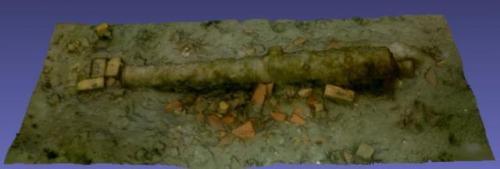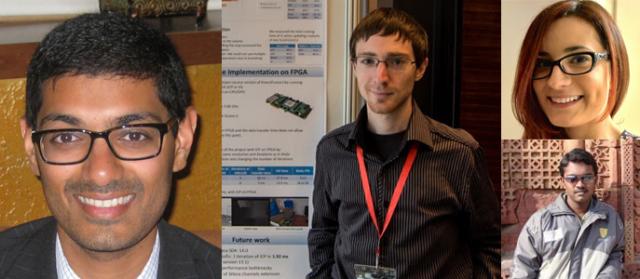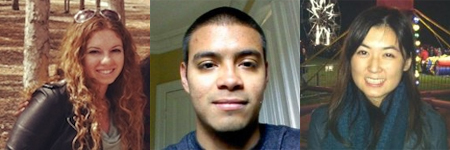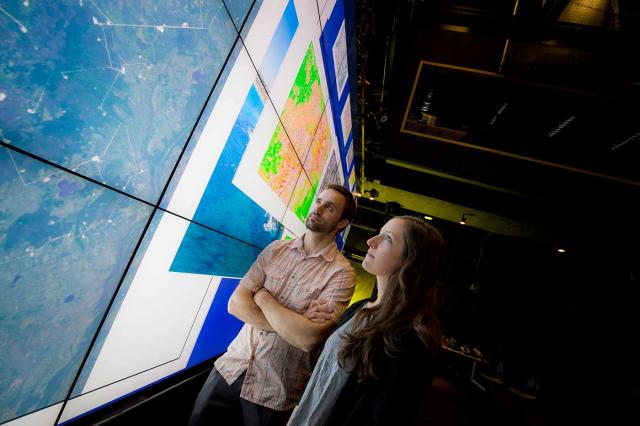
Five CSE graduate students have received inaugural Frontiers of Innovation Scholars Program (FISP) grants from the university. They include Jagannathan Venkatesh, a Ph.D. student working with CSE Prof. Tajana Rosing, and an as-yet-unnamed CSE graduate student who will work with Qualcomm Institute research scientist (and CSE instructor) Jurgen Schulze. For most of the grad students, the awards come with $25,000 scholarships. [Pictured l-r: Ph.D. students Venkatesh, Gautier, Shearer, and M.S. student Thangarajan, bottom right].
 Ph.D. student Quentin Gautier will work with CSE Prof. Ryan Kastner on 3D modeling for underwater archaeology, specifically to develop an underwater imaging platform for creating 3D models of underwater artifacts. Separately, Kastner will work with Qualcomm Institute manager Curt Schurgers as co-mentors for CSE Ph.D. student Alexandria Shearer, who will do her research on aerial LIDAR scanning. Shearer’s research is applied specifically to aerial laser scanning of Mayan archaeological sites (which are often complicated because ruins are inaccessible and tend to be located in areas with dense jungle canopies). “Both of these projects were kickstarted with previous awards from the Qualcomm Institute through its Calit2 Strategic Research Opportunities grant program,” noted Kastner.
Ph.D. student Quentin Gautier will work with CSE Prof. Ryan Kastner on 3D modeling for underwater archaeology, specifically to develop an underwater imaging platform for creating 3D models of underwater artifacts. Separately, Kastner will work with Qualcomm Institute manager Curt Schurgers as co-mentors for CSE Ph.D. student Alexandria Shearer, who will do her research on aerial LIDAR scanning. Shearer’s research is applied specifically to aerial laser scanning of Mayan archaeological sites (which are often complicated because ruins are inaccessible and tend to be located in areas with dense jungle canopies). “Both of these projects were kickstarted with previous awards from the Qualcomm Institute through its Calit2 Strategic Research Opportunities grant program,” noted Kastner.
CSE research scientist Nadir Weibel was awarded $25,000, which will allow him to employ CSE Master’s student Narendran Thangarajan to work for the Winter and Spring quarters, after which he will graduate. The funding will allow Thangarajan to work on a project to detect the social networks of San Diegans considered at-risk of contracting HIV. “Through this interdisciplinary project, I am learning how to participate in research where human subjects are involved, as well as medical practices related to HIV,” said Thangarajan. “The Frontiers of Innovation funding will allow me to spend more time on research, which in turn will help our research project to advance and reach our envisioned goal.”
 According to CSE’s Weibel, the researchers will use "publicly available Twitter data to uncover the structure and content of the online social networks of HIV at-risk individuals." Once the Twitter network is characterized, it will be compared to the real-world network of patients already known to the UC San Diego School of Medicine's AntiViral Research Center (AVRC) and Dr. Susan Little, whose Primary Infection Research Consortium (PIRC) collects multidimensional epidemiological, clinical, treatment, social and behavioral data from HIV-infected and HIV at-risk individuals (hence the interdisciplinary nature of the research). "Our goal is to use the information from the online social network to initiate and inform targeted, real-world HIV prevention interventions," said Thangarajan. "This could involve stepped-up efforts in specific parts of the city, or specific segments of the population."
According to CSE’s Weibel, the researchers will use "publicly available Twitter data to uncover the structure and content of the online social networks of HIV at-risk individuals." Once the Twitter network is characterized, it will be compared to the real-world network of patients already known to the UC San Diego School of Medicine's AntiViral Research Center (AVRC) and Dr. Susan Little, whose Primary Infection Research Consortium (PIRC) collects multidimensional epidemiological, clinical, treatment, social and behavioral data from HIV-infected and HIV at-risk individuals (hence the interdisciplinary nature of the research). "Our goal is to use the information from the online social network to initiate and inform targeted, real-world HIV prevention interventions," said Thangarajan. "This could involve stepped-up efforts in specific parts of the city, or specific segments of the population."
An additional group of graduate recipients from other departments will work under the co-mentorship of CSE faculty members including Kastner as well as Lawrence Saul, Gary Cottrell, and Vineet Bafna.
 But that's not all. Among 100 students campus-wide to receive the smaller $3,000 scholarships for undergraduates, at least three are going to CSE students, and possibly double that number (because some of the grants were given to faculty for them to assign at their discretion). The named undergrads from CSE include senior Antonella Wilby (majoring in computer science) and Jorge Pacheco (computer engineering junior), who are part of a four-person team under professor Kastner in his capacity as co-director of the Engineers for Exploration program. Also getting funding: CSE undergrad Jennifer Lu, who will work with ECE Prof. Gert Lanckriet on a "multimodal machine learning framework for activity and mood recognition using mobile and stationary sensors." [Pictured above (l-r): CSE undergrads Wilby, Pacheco and Lu.]
But that's not all. Among 100 students campus-wide to receive the smaller $3,000 scholarships for undergraduates, at least three are going to CSE students, and possibly double that number (because some of the grants were given to faculty for them to assign at their discretion). The named undergrads from CSE include senior Antonella Wilby (majoring in computer science) and Jorge Pacheco (computer engineering junior), who are part of a four-person team under professor Kastner in his capacity as co-director of the Engineers for Exploration program. Also getting funding: CSE undergrad Jennifer Lu, who will work with ECE Prof. Gert Lanckriet on a "multimodal machine learning framework for activity and mood recognition using mobile and stationary sensors." [Pictured above (l-r): CSE undergrads Wilby, Pacheco and Lu.]
 A few other CSE students, still to be named, may be recruited by Falko Kuester, director of the Qualcomm Institute's Center of Interdisciplinary Science for Art, Architecture and Archaeoloogy (CISA3). Kuester was awarded six undergraduate scholarships, who will work on CISA3 projects in cultural heritage and engineering.
A few other CSE students, still to be named, may be recruited by Falko Kuester, director of the Qualcomm Institute's Center of Interdisciplinary Science for Art, Architecture and Archaeoloogy (CISA3). Kuester was awarded six undergraduate scholarships, who will work on CISA3 projects in cultural heritage and engineering.
“The Frontiers of Innovation Scholars Program builds the interdisciplinary expertise we will need to address national and global challenges,” said Chancellor Pradeep K. Khosla in announcing the scholarships. “Like the ongoing Frontiers of Innovation seed funding for new research centers on campus, this program is an investment in the university’s leadership role in interdisciplinary research.”
According to Vice Chancellor for Research Sandra A. Brown, whose Office of Research Affairs oversees parts of the Frontiers of Innovation programs, “these investments will forge new intellectual enterprises, which increasingly rely on the ability to work across diverse disciplines, either individually or as members of multidisciplinary teams.”

